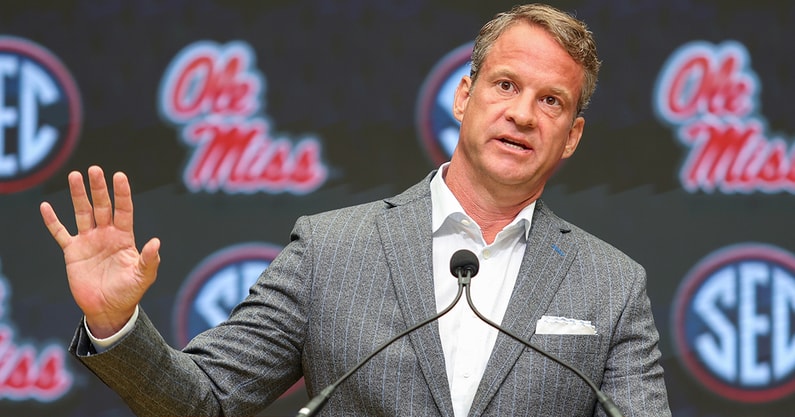Lane Kiffin calls out rev-share rules, says some teams 'not staying within' cap

While adjusting to the revenue-sharing era in college athletics, coaches have made their frustrations clear. Big 12 coaches called for transparency and clarity last week at the conference’s media days, and Lane Kiffin also shared his thoughts on the post-House v. NCAA settlement landscape.
Kiffin called out the rules around revenue-sharing set under the agreement. Schools are now able to directly share up to $20.5 million with athletes, and the first payments went out this month. That figure is set to increase annually under the 10-year settlement.
Rev-share offers cannot be sent to recruits until their senior years of high school, meaning Aug. 1 is a landmark date. As Kiffin looked at where things stand, he sees schools going above that $20.5 million cap. That adds to the questions he has.
“We get a lot of questions like, what’s it like now?” Kiffin said in his remarks Monday at SEC Media Days. “We’ve been operating – we have – under these cap guidelines of what was coming and what it was going look like. I think we’ve done a really good job of that. Obviously means you can’t sign as many players as you would like at times because you have a budget. So we’re obviously hopeful that will be rewarded by doing that.
“I think it’s obvious people aren’t staying within that cap, so I think the whole thing will be, what does that look like? That’s what we don’t know. What does it look like when you don’t and what are the punishments for that? Do you win and that comes later? So that’s remained to be seen, but already got the questions about the cap, what that’s like having to do that. We’ve been doing that for a while, operating on that.”
Lane Kiffin: College football salary cap is ‘what we attempted’
As the NIL era transformed college sports, Lane Kiffin was outspoken about its impact. He was also quick to make jokes on social media and recalled a quip about Texas A&M’s highly rated recruiting class in 2022 as dollars started flowing.
Top 10
- 1Breaking
Dave Portnoy, Barstool
Nearing Fox Sports deal
- 2Hot
DJ Lagway
Injury update
- 3
Kalen DeBoer
Responds to Nick Saban rumors
- 4
Thomas Castellanos
Doubles down on Bama trashing
- 5Trending
Teams that could surprise
Ranking Top 16 surprise teams
Get the Daily On3 Newsletter in your inbox every morning
By clicking "Subscribe to Newsletter", I agree to On3's Privacy Notice, Terms, and use of my personal information described therein.
The cap set by the House settlement is for revenue-sharing from the school. Third-party NIL deals will be vetted by the Deloitte-operated clearinghouse, NIL Go, if they are worth more than $600. That has been the subject of frustration from NIL collectives in light of recent guidance from the College Sports Commission.
But when asked whether there should be a salary cap in college football – something Deion Sanders suggested a week ago at Big 12 Media Days – Kiffin said that’s the goal with the rev-share limit. But he stressed the need for clarity with regard to following the rules.
“I think that’s what we attempted. Doesn’t seem like that’s working very well,” Kiffin said of the $20.5 million cap. “So yeah, I mean, stating the obvious. That was the intention of what was going on because there were so many complaints when NIL started about, okay, everybody has different advantages, and different payrolls. Saw those a couple years ago. I was up here at one of these joking about a luxury tax based on A&M’s spending or whatever it was. So that was supposed to be being fix, and now it’s not.
“Again, we’ve tried to follow the guidelines because that’s what we were told we needed to do. I’m not saying they’re wrong for doing it – I’m not calling anybody out. If the system isn’t solid enough to prevent that, then we really don’t have a system. So you’re not operating on a salary cap.”